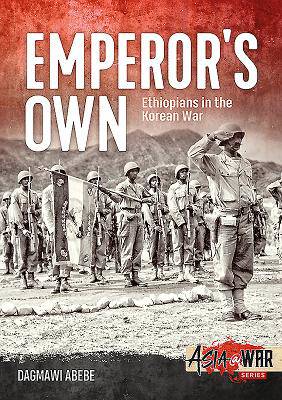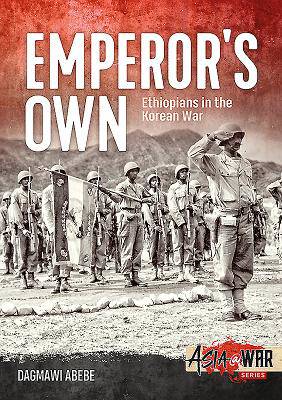
Bedankt voor het vertrouwen het afgelopen jaar! Om jou te bedanken bieden we GRATIS verzending (in België) aan op alles gedurende de hele maand januari.
- Afhalen na 1 uur in een winkel met voorraad
- In januari gratis thuislevering in België
- Ruim aanbod met 7 miljoen producten
Bedankt voor het vertrouwen het afgelopen jaar! Om jou te bedanken bieden we GRATIS verzending (in België) aan op alles gedurende de hele maand januari.
- Afhalen na 1 uur in een winkel met voorraad
- In januari gratis thuislevering in België
- Ruim aanbod met 7 miljoen producten
Zoeken
Emperor's Own
The History of the Ethiopian Imperial Bodyguard Battalion in the Korean War
Dagmawi Abebe
€ 27,95
+ 55 punten
Omschrijving
On June 25, 1950, as he was flying back to Washington D.C. to deal with the outbreak of war in Korea, US President Harry Truman thought, "In my generation, this was not the first occasion when the strong had attacked the weak. I recalled some earlier instances: Manchuria, Ethiopia, Austria. I remembered how each time that the democracies failed to act it had encouraged the aggressor to keep going ahead. Communism was acting in Korea just as Hitler, Mussolini, and the Japanese had acted, ten, fifteen, and twenty years earlier.... If this was allowed to go unchallenged it would mean a third world war."
In response to North Korea's invasion of South Korea, the United Nations sent an urgent plea to its members for military assistance. Sixteen nations answered the call by contributing combat troops. Ethiopian Emperor Haile Selassie, a stalwart advocate of collective security, dispatched an infantry battalion composed of his Imperial Bodyguard to affirm this principle which had been abandoned in favor of appeasement when the League of Nations (the predecessor to the United Nations) gave Fascist Italy a free-hand to invade Ethiopia in 1935.
The unit designated "Kagnew Battalion" was actually successive battalions which rotated yearly and fought as part of the US 32nd Infantry Regiment, 7th Infantry Division. When they arrived, these warriors from an ancient empire were viewed with suspicion by their American allies as they were untested in modern warfare. Their arrival in Korea also coincided with the desegregation of the US Army.
However, the Ethiopians eventually earned the respect of their comrades after countless bloody, often hand-to hand battles, with all three battalions which served during the war earning US Presidential Unit Citations. Remarkably, Kagnew was the only UN contingent which did not lose a single man as prisoner of war or missing in action.
Until now, few have heard the story of their stand for collective security and against aggression. The Emperor's Own provides insight into who these men and women were as well as what became of them after the war.
In response to North Korea's invasion of South Korea, the United Nations sent an urgent plea to its members for military assistance. Sixteen nations answered the call by contributing combat troops. Ethiopian Emperor Haile Selassie, a stalwart advocate of collective security, dispatched an infantry battalion composed of his Imperial Bodyguard to affirm this principle which had been abandoned in favor of appeasement when the League of Nations (the predecessor to the United Nations) gave Fascist Italy a free-hand to invade Ethiopia in 1935.
The unit designated "Kagnew Battalion" was actually successive battalions which rotated yearly and fought as part of the US 32nd Infantry Regiment, 7th Infantry Division. When they arrived, these warriors from an ancient empire were viewed with suspicion by their American allies as they were untested in modern warfare. Their arrival in Korea also coincided with the desegregation of the US Army.
However, the Ethiopians eventually earned the respect of their comrades after countless bloody, often hand-to hand battles, with all three battalions which served during the war earning US Presidential Unit Citations. Remarkably, Kagnew was the only UN contingent which did not lose a single man as prisoner of war or missing in action.
Until now, few have heard the story of their stand for collective security and against aggression. The Emperor's Own provides insight into who these men and women were as well as what became of them after the war.
Specificaties
Betrokkenen
- Auteur(s):
- Uitgeverij:
Inhoud
- Aantal bladzijden:
- 96
- Taal:
- Engels
- Reeks:
Eigenschappen
- Productcode (EAN):
- 9781912866311
- Verschijningsdatum:
- 16/10/2019
- Uitvoering:
- Paperback
- Formaat:
- Trade paperback (VS)
- Afmetingen:
- 203 mm x 295 mm
- Gewicht:
- 385 g

Alleen bij Standaard Boekhandel
+ 55 punten op je klantenkaart van Standaard Boekhandel
Beoordelingen
We publiceren alleen reviews die voldoen aan de voorwaarden voor reviews. Bekijk onze voorwaarden voor reviews.









